13 Section 1-13: Nominative Case & Word Order
1-13: Nominative Case and Word Order
German has four cases: nominative, accusative, dative, and genitive. A “case” in German basically tells what the word does in a sentence. In this chapter, you are learning the nominative case. The nominative case deals with the subject of the sentence—the person or thing doing the action of the sentence.
The subject is the word that does the action of the sentence. It is also the word that determines how you conjugate the verb, i.e. which endings you will put on the end of the verb from the verb chart. The subject of each sentence is highlighted below.
- Ich habe im März Geburtstag.
- Frau Schmidt ist nicht sehr optimistisch.
- Der Student kommt aus Saudi-Arabien.
- Meine Mutter spielt gern Klavier.
- Das Wetter ist kalt und regnerisch.
- Marions Großmutter geht morgen ins Restaurant.
In all of these examples, the subject came first in each sentence, and the verb came second. This word order is often seen in German sentences. This is also how we often form sentences in English.
HOWEVER, in German, the subject does not have to come first as long as the verb stays in second position.
The following examples have the verb in 2nd position, but some of them have a time expression at the beginning instead of the subject. The verb is bold-faced, and the subject is in italics. To the right is an alternate word order that might make more sense for English speakers.
- Morgen reisen wir nach Europa. (Wir reisen morgen nach Europa).
- *Im Herbst ist das Wetter kühl. (Das Wetter ist kühl im Herbst).
- Meine Schwester malt sehr gern.
- Heute habe ich Mathe. (Ich habe heute Mathe.)
*The sentence “Im Herbst ist das Wetter kühl,” may be confusing because it looks like the verb is 3rd. Prepositional phrases count as one element.
- im Herbst
- nach Europa
- zu Karoline
Although the above phrases have more than one word, it would make no sense to split them up. Therefore, prepositional phrases should be kept together.

Click the link to see me reteaching this concept.
EXTRA PRACTICE: Click on Germanzone.org’s site to do another activity in which you will be moving the underlined word or phrase to the beginning of the sentence. Don’t forget to put the verb 2nd!
Now try Dr. Claudia Kost’s and Crystal Sawatzky’s (University of Alberta) exercises to review the nominative case and word order:
Video. Watch Easy German’s video, Nominativ, to see more examples of nouns in the nominative case; this time it’s in su-u-u-uper slow German. Notice that the verb is in 2nd position.
Ex. B: Video. Nicos Weg. Folge 7: Woher kommst du?
Watch the video and do the online activities. 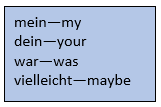
Ex. C: Video. Nicos Weg. Folge 8: Nico hat ein Problem.
Watch the video and do the online activities. You will be conjugating the verbs sein and haben as well as several other verbs. Feel free to look back at your notes if you need a refresher on these verbs.
Word order with yes/no questions:
To make questions that can be answered with ja or nein, word order is exactly like English: VERB/SUBJECT/EVERYTHING ELSE
Statement: Der Student ist freundlich. (The student is friendly.)
Question: Ist der Student freundlich? (Is the student friendly?)
Statement: Mein Bruder arbeitet viel. (My brother works a lot.)
Question: Arbeitet mein Bruder viel? (Does my brother work a lot?)
(Works my brother a lot?)
In English, we add an extra “do” or “does” to make yes/no questions. German does not. If necessary, reword the sentence to sound simpler before making a question.
Do you jog? (Split verb/subject)
TAKE OUT “DO”: Jog you?(Verb/subject)
German: Joggst du? (Verb subject)
When in doubt, just put the verb first, and you have an instant question.

Click on the video to see me reteaching how to make yes/no questions.
Ex. E: Interview. Ask your classmates 8 yes/no questions about themselves. Don’t forget to put the verb first.
Beispiele:
Hörst du gern Musik?
Lernst du Spanisch?
Wohnst du in…?
Question Words
You have already seen several question words so far. Here they are all together.
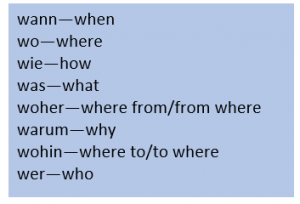
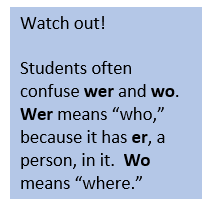
- Wann arbeitest du? When do you work?
- Wo wohnst du? Where do you live?
- Wie heißt der Professor? How is the professor called?
- Was ist das? What is that?
- Woher kommen Sie? Where do you come from?
- Warum lernst du Deutsch? Why are you learning German?
- Wohin gehst du? Where are you going (to)?
- Wer singt? Who is singing?/Who sings?
Notice that the word order is exactly like English; the question word comes first, THEN the verb.
Watch this scene from Die Unglaublichen to hear a question with the question word wo:

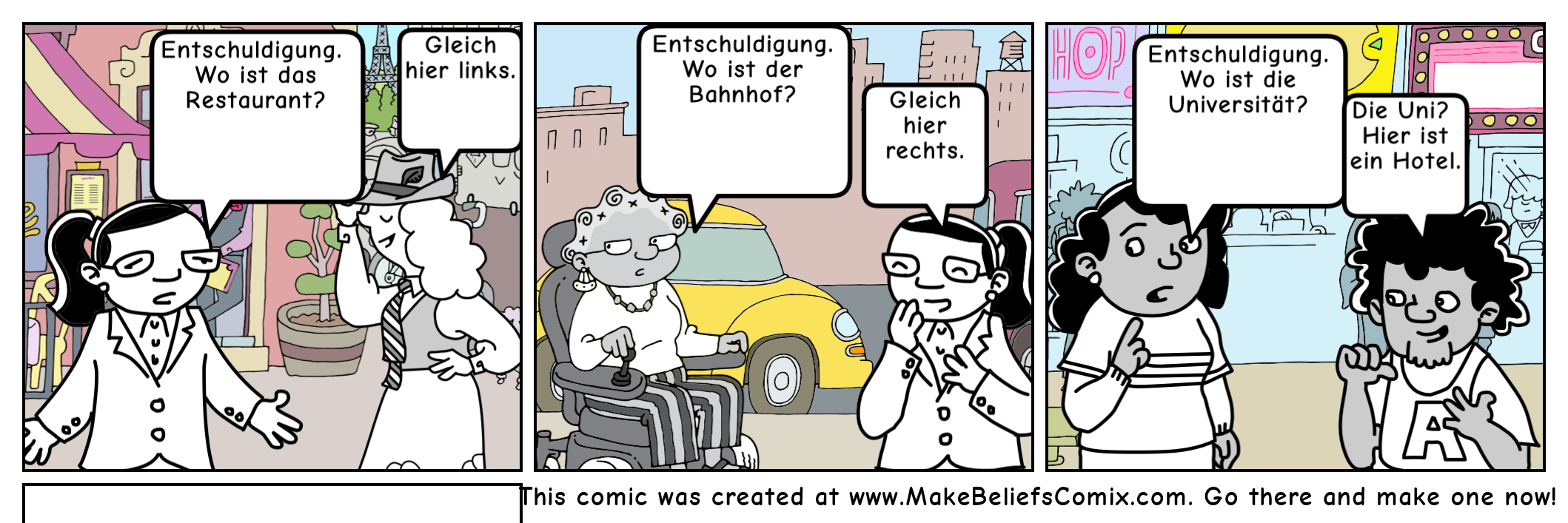
Click the link to watch me reteaching how to use question words.
Check out Dr. Claudia Kost’s and Crystal Sawatzky’s (University of Alberta) summary of word order with questions:
Listen to Glasperlenspiel’s song, Dein Geheimnis, (2011), to hear lots of examples of questions and question words.
Songtext: https://genius.com/Glasperlenspiel-dein-geheimnis-lyrics
Practice making more questions with Dr. Claudia Kost’s and Crystal Sawatzky’s (University of Alberta) exercise:
EXTRA PRACTICE: Question or statement? Go to Germanzone.org’s website and determine whether each set of words makes up a question or a statement.
- https://www.germanzone.org/word-order-1-questions-statements/.
- https://www.germanzone.org/word-order-2-statements-questions/.
Then try Dr. Claudia Kost’s and Crystal Sawatzky’s (University of Alberta) quiz to review making questions with question words in German.
Time and Place
In German sentences, time expressions come before place expressions. This is the exact opposite of English, which usually puts place before time.

TP (Time/Place)
In each sentence below, the time phrase is in bold-face print while the place is in italics.
(Subject/Verb/Time/Place.)
Wir fliegen am Mittwoch nach Deutschland.
Mein Großvater bleibt morgen zu Hause.
Die Studentin reist in zwei Tagen nach Alaska.
Der Mann arbeitet im Winter im Restaurant.

You already know several time expressions using months and days of the week. Here are some place expressions to use for now, along with a few more time expression.
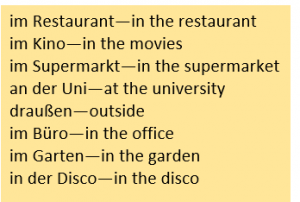
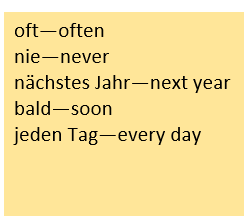
Ex. H: TP! Translate the following sentences into German, using correct word order→subject/verb/time/place.
Beispiel: The student sings at the university tomorrow.
→Der Student (die Studentin) singt morgen an der Uni.
(subject) (verb) (time) (place)
- We swim every day in the summer.
- Do you cook at home often?
- He is at the movie theater a lot.
- They are living in Sweden next year.
- They never play outside.
- Y’all (you guys) stay in the garden a lot.
- She likes to dance in the disco.
- He likes to swim at home in July.
Ex. I: Lesen wir! Read the following paragraph and answer the questions about it.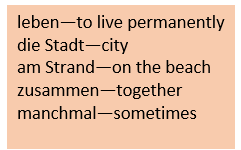
Helen lebt in Aachen. Aachen ist eine Stadt in Deutschland. Helen ist neununddreißig Jahre alt. Sie hat einen Mann, Martin, und zwei Kinder—Benno und Toni. Helen und Martin reisen sehr gern nach Frankreich. Helen spaziert gern am Strand, und Martin surft sehr gern. Benno und Toni spielen zusammen am Strand.
Helen hat andere Hobbys. Sie wandert mit Benno und Toni. Sie malt sehr gut. Sie lernt Englisch im Winter, und sie schwimmt im Sommer. Sie bleibt gern zu Hause mit ihrer Familie, aber manchmal fliegt sie nach Italien. Sie findet Italien super.
- Wo lebt Helen?
- Wie alt ist Helen?
- Wie viele Kinder hat Helen?
- Wohin reist Helen gern?
- Was macht Martin gern?
- Was macht Helen gern?
- Was macht sie im Winter?
- Wie findet Helen Italien?
Need a review of word order? Watch YourGermanTeacher’s video to see more.

